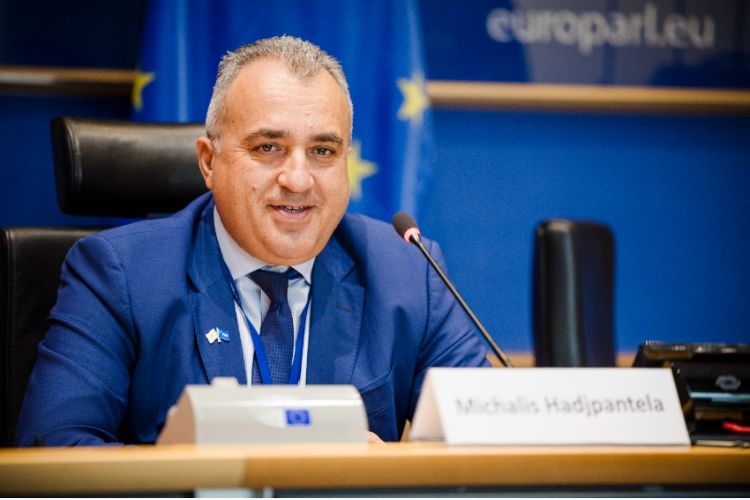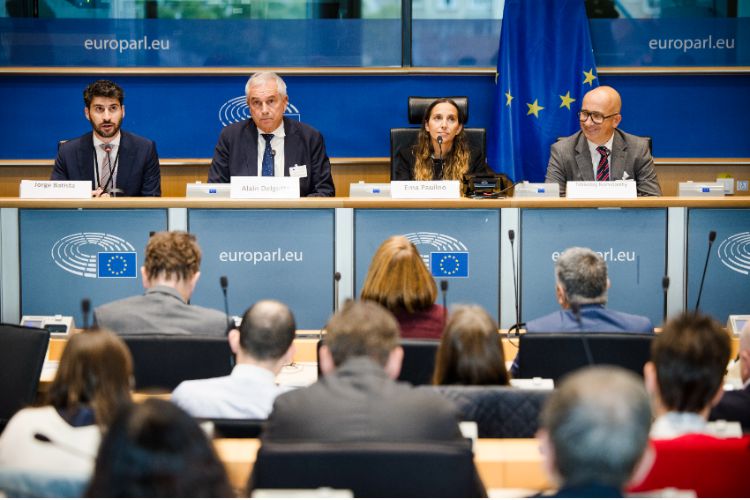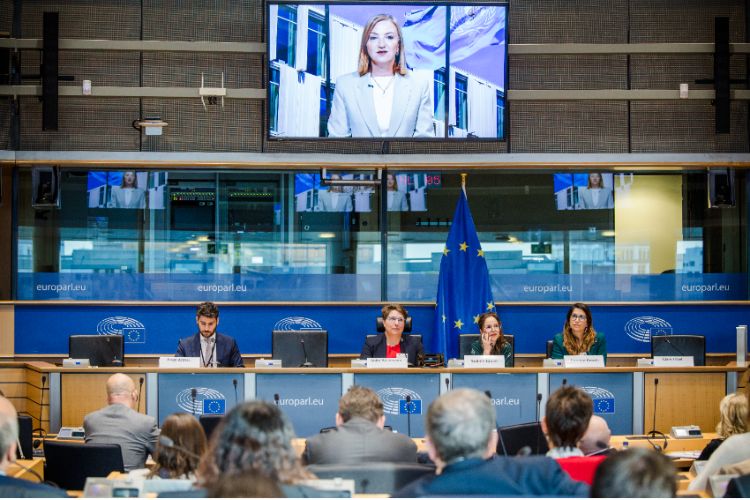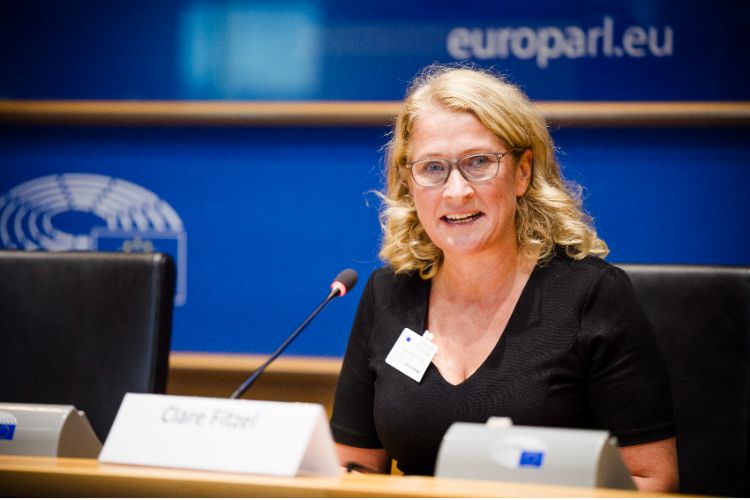Following the publication of the Report on Pharmacy Services in Europe by Pharmaceutical Group of the European Union (PGEU), policymakers, health professionals and leaders were brought together at the European Parliament in Brussels to talk about the growing role of community pharmacists, offering a platform to talk about how pharmacists offer a varied range of daily services to people.
The event was launched with a video contribution by European Parliament’s President Roberta Metsola. She highlighted how visible and accessible pharmacies are and pointed out how they are the trusted first point of contact with citizens, particularly in situations of emergency like the COVID-19 pandemic.
She defined pharmacists as key in countering misinformation, backing prevention and securing equal access to medication and recalled their role as irreplaceable partners in developing robust healthcare systems: “Today, community pharmacies are doing even more, offering services that go well beyond handing out medicines”.
To set out the political context faced by the sector, EPP Cypriot MEP Michalis Hadjipantela, who co-hosted the event with S&D Lithuanian MEP Vytenis Andriukaitis, flagged problems in Europe's health workforce. As a medical doctor and Cyprus former Minister of Health, he emphasised that pharmacists should be enabled to practise at the top level of their education to provide services that would alleviate overstretched hospitals and improve patient access.
As the Covid-19 pandemic drew a lot of attention on hospital and clinics, “pharmacies remained on the frontline, providing safe, effective, and accessible care where communities needed it most” recalled Hadjipantela, advocating that pharmacists taking on roles in different areas like vaccination, management and prevention of disease would make European health systems sustainable and calling on policymakers to support such reforms by sharing best practice between Member States.
 MEP Michaelis Hadjipantela, co-host of the event, delivered the opening remarks
MEP Michaelis Hadjipantela, co-host of the event, delivered the opening remarks
The first panel discussion followed with pharmacists’ associations representatives from France, Portugal and Poland, to discuss how pharmacies provide services that far transcend mere dispensing of medication, complemented by a presentation of the newly published report.
Alain Delgutte, Member of the Board for the French Chamber of Pharmacists, shared France’s experience by showing how pharmacists have been integrated into vaccination programmes and disease surveillance. He emphasised that these new responsibilities clearly demonstrate the added value pharmacists bring to public health but warned that remuneration must be consistent to ensure the sustainability of services and avoid penalising professionals in the sector.
Today, community pharmacies are offering services that go well beyond handing out medicines
Ema Paulino, President of the Portuguese National Association of Pharmacies, highlighted how pharmacies have expanded their role by offering screening services for conditions such as hypertension and diabetes. These initiatives, she explained, ease the burden on general practitioners and improve early diagnosis, proving pharmacies’ direct support for public health objectives. “We call for further pharmacies involvement in antimicrobial resistance and infection control plans, and also for the integration of digital tools in pharmacy practice”, she concluded.
Mikolaj Konstanty, Vice-President of the Polish Pharmaceutical Chamber, described Poland’s recent efforts to build broader pharmacy services, including vaccination. He underlined patients’ enthusiasm for pharmaceutical care pilots and argued that political and financial support remains essential for scaling them up. He closed with a symbolic example: Poland’s former Health Minister being vaccinated in a pharmacy, which, he said, illustrated how pharmacists’ proximity role extends well beyond the COVID-19 pandemic.
 Pharmacies associations' representatives highlighted the large amount of services provided
Pharmacies associations' representatives highlighted the large amount of services provided
The second panel shed light on the broader contribution from pharmacists to health systems and patients from a civil society perspective.
WHO Europe’s Professor Dr. Natasha Azzopardi-Muscat shared a video message to open the discussion. She stressed that community pharmacies are part of primary care systems and noted that they performed a role in assuring continuity of care under pandemic pressure and claimed that pharmacists could have more to contribute on preventing disease, digital health and controlling chronic disease if right frameworks are devised.
European Patients Forum’s Policy Officer Solène Jouan stressed that pharmacies are often the most accessible healthcare locations and the first source of advice for many citizens. She stressed the importance of policies that allow pharmacies to meet evolving patient needs, particularly in prevention and health literacy. Asking a pharmacist “means trust, safety of the medicines you are going to use, and accessibility to information”, she told the audience, calling for greater patient literacy to ensure that pharmacies can deliver their full value.
We've got a wide and expanding range of pharmacy services from medicine and screening to medicines optimisation, vaccinations and chronic disease management
Candan Kendir, Health Policy Analyst at the OECD, presented international evidence showing how pharmacy services improve both efficiency and equity in health systems. She pointed out that services offered by pharmacies are particularly valuable for people with chronic conditions, adding: “What needs to be done more is about being future-proof, because health systems are a challenge, and this is what policymakers care about”. She concluded that alongside direct care, teaching people how to manage their own health “shouldn’t remain a blind spot.”
University of Innsbruck’s Professor Dr. Anita Weidmann reinforced these points with research demonstrating how pharmacy-led interventions such as structured medication reviews improve adherence and reduce risks from polypharmacy. “There's also a lot of interdisciplinary healthcare workers who have experience working with pharmacists in various settings”, she noted, emphasising the importance of multi-sectorial cooperation across the health sector.
 Pharmacy services are proven to generate positive public outcomes and counter health disinformation
Pharmacy services are proven to generate positive public outcomes and counter health disinformation
After panellists further inquired about issues associated with education and training for future pharmacists and how vital digital tools integration is for pharmacists to share data with other health professionals and deliver services more effectively, PGEU’s President Clare Fitzell delivered the closing speech.
She reaffirmed the event's core message: public health relies on pharmacies and must be considered so in law and funding. She pointed out that community pharmacists already play a leading role in vaccination, prevention and care for chronic disease, but these services must receive proper support if they are to spread across Europe.
 PGEU’s President Clare Fitzell delivered the closing speech
PGEU’s President Clare Fitzell delivered the closing speech
Fitzell called for immediate action in three areas: expanding the scope of practice for pharmacists, achieving sustainable remuneration for their services, and integrating digital solutions that enable them to practice more effectively in conjunction with doctors and nurses.
She underlined that pharmacies have a wide and expanding range of services from medicine to vaccinations and chronic disease management and concluded: “Our report sets out a practical roadmap to build on this success and expand these benefits to patients in every community”.
Panellists and the audience unanimously aligned on one clear idea: community pharmacists are and will remain indispensable to provide strong and sustainable healthcare to the future of Europe.
Explore PGEU’s Report on Pharmacy Services in Europe to see how pharmacies transform patient care and support stronger healthcare systems
Sign up to The Parliament's weekly newsletter
Every Friday our editorial team goes behind the headlines to offer insight and analysis on the key stories driving the EU agenda. Subscribe for free here.